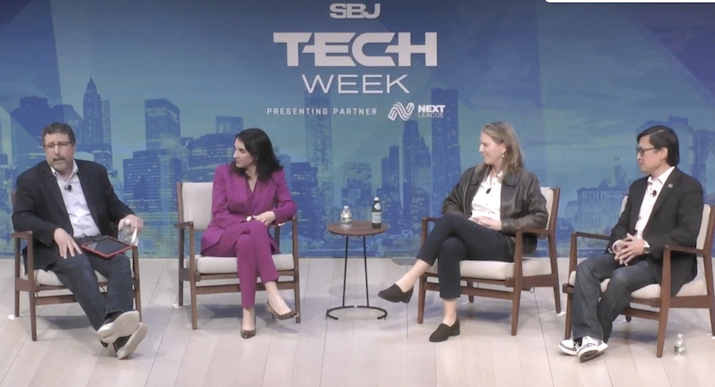AWS, Genius Sports, Google Cloud, IBM on the AI Revolution and its Impact on Sports Broadcasting
The technology drives multiple efforts in enhancing the fan experience and engagement
Story Highlights
Artificial intelligence has spurred activity in the sports-business and -technology industry, just as it has across most industries. At the recent SBJ Tech Week conference, executives from Genius Sports, IBM, Google Cloud, and Amazon Web Services explained where and why the technology is deployed, its application in sports production, and how it can provide a more compelling fan experience.

Genius Sports’ Sean Conroy: “The availability of sport across digital platforms and changing consumer behaviors are creating new opportunities and possibilities to drive engagement.”
“We’re at an interesting crossroads here in the media and sports ecosystem,” said Sean Conroy, EVP, North America, Genius Sports, during a brief presentation on the future of immersive broadcasts. “The availability of sport across digital platforms and changing consumer behaviors are creating new opportunities and possibilities to drive engagement. We [expect] these new experiences around sports in the future to be much more focused on choice and allowing individuals and fans to curate and own their own experience.”
Partnered with the NFL, Conroy explained, Genius Sports has deployed artificial intelligence and data to “create new augmented-content experiences” for the league’s media partners and its NFL+ streaming service: for example, on-screen graphics display a player’s route and speed on the field.
His company has also worked with Amazon Prime Video to create a Thursday Night Football alternative broadcast dubbed “Prime Vision.” “We worked to take data and apply our machine learning and AI to create a mode of a game that is very focused on the stats-hungry, analytical type of fan.”
Julie Souza, global head of sports, Amazon Web Services, noted a lot of energy with artificial intelligence around “operational efficiency” and use of the technology to complete “time-intensive tasks.” AWS worked with the PGA TOUR, for example, to launch a chat bot for its internal teams and production partners to “query multi-modal data” and source content from video archives, scoring data, and past media guides to provide additional context during a golf match.

From left: Veritone’s Gary Warech, AWS’s Julie Souza, IBM’s Elizabeth O’Brien, and Google Cloud’s Albert Lai at SBJ Tech Week
AWS will soon be working with Germany’s Bundesliga on creating text commentary in several languages. “There’s emotion in sport that,” Souza noted. “You have to be able to convey. You have to use the colloquialisms of that culture, of that country, of that language. How do we teach computers to do that? … Making sure that we’re being honest to and stewards of that content in an earnest way is where I start to get excited.”
IBM debuted AI sports commentary at the 2023 Masters golf tournament. Said Elizabeth O’Brien, program director, worldwide sports and entertainment sponsorship marketing, IBM, “People who couldn’t actually see well could understand what was happening, but there also was an accessibility play from your ability to watch whatever you want when you want and actually have something explaining to you what you’re watching.”
The panelists shared predictions of the future of generative AI over the next 12-36 months.
“The applications of good ole AI/ML are still limitless,” said Souza. “I think we will see where gen AI goes on top of that. I don’t think we work backwards from gen AI. I think we say, ‘What are the business questions we’re trying to solve? Are we trying to make our game safer? Are we trying to engage fans further? Are we trying to lower costs?’ … Then we work backwards and try to find the right tools.”
O’Brien said, “We have to get [the basic principles] right. We have to make sure the data is the right data and is trusted data. We have to make sure we’re choosing the right foundation models. We have to make sure there’s governance in place. You have to monitor the models so they don’t hallucinate and they don’t drift. All of that stuff is stuff that needs to evolve as well.”
Albert Lai, director, global strategic industries, media and entertainment, Google Cloud, is hopeful that companies will start sharing their generative-AI success stories and outcomes publicly, including around productivity, cost saving, and value creation: “Encourage the entire ecosystem and say, ‘Yes, there are responsible ways to do this while protecting consumers, companies, and data but also benefiting, monetizing, and doing it in a way that makes everyone healthy.’”
